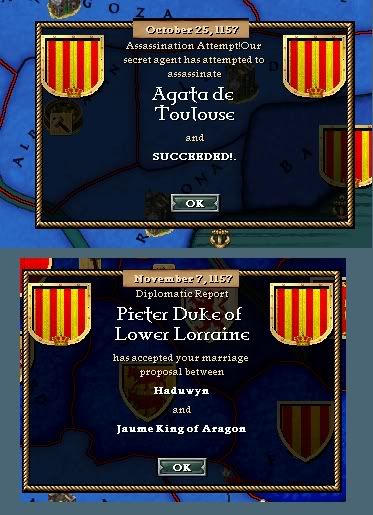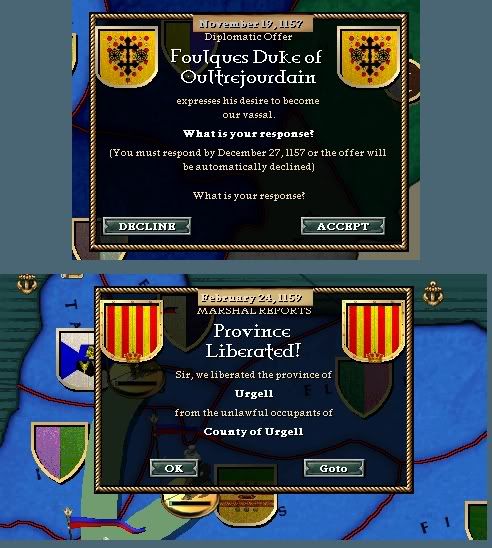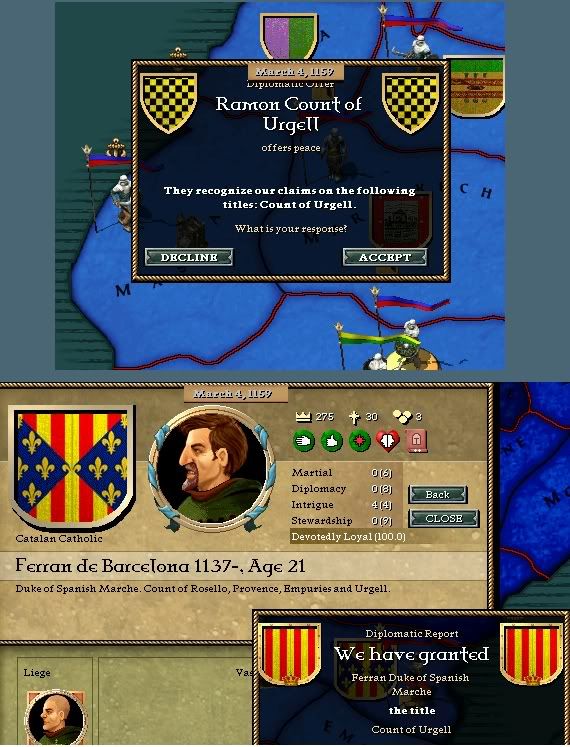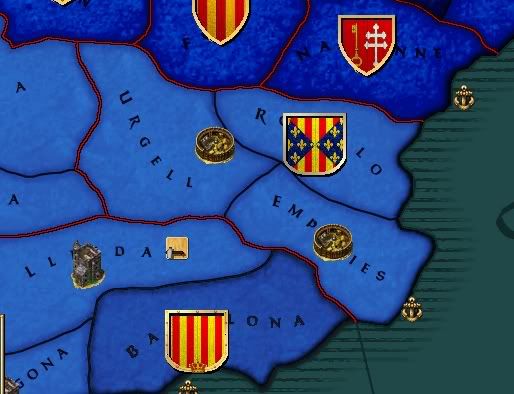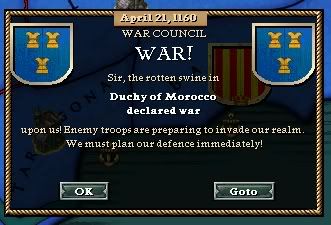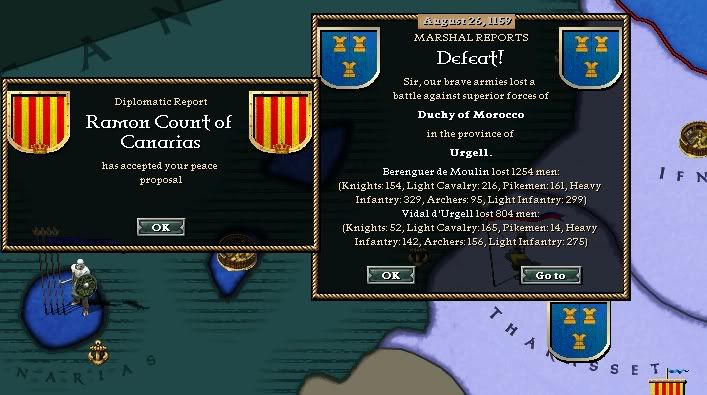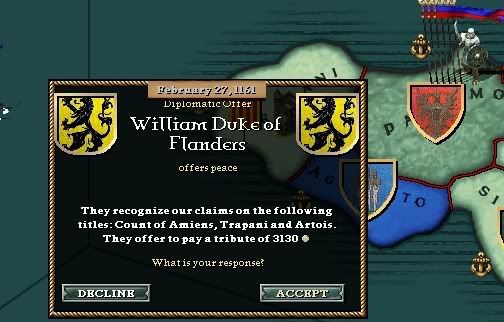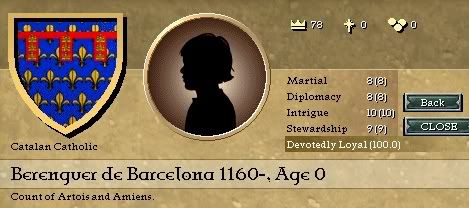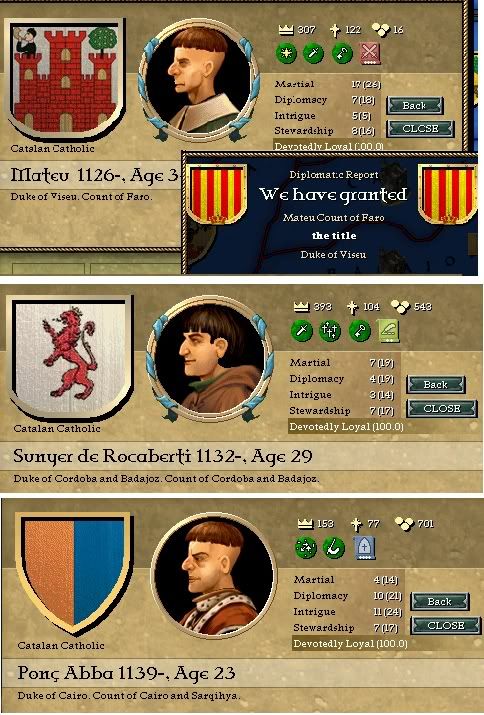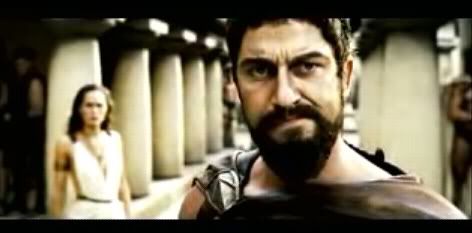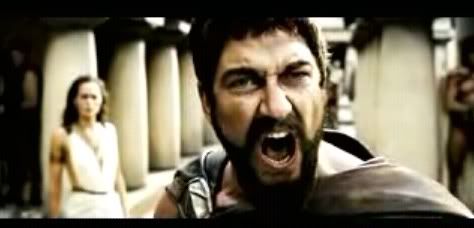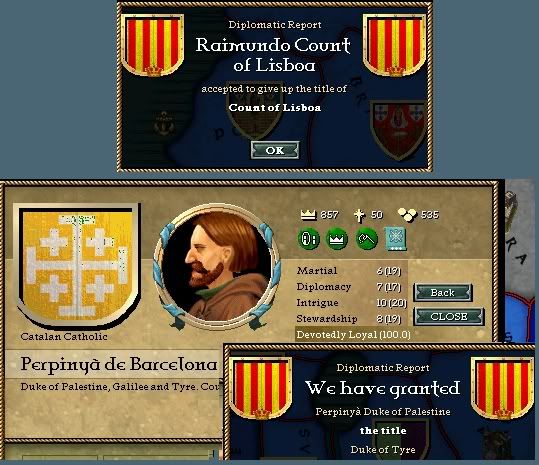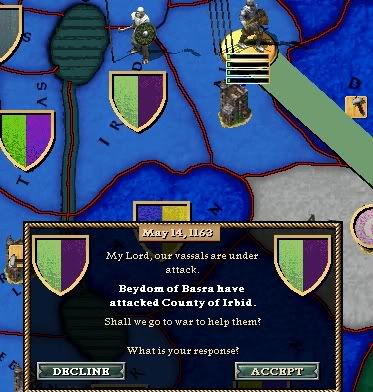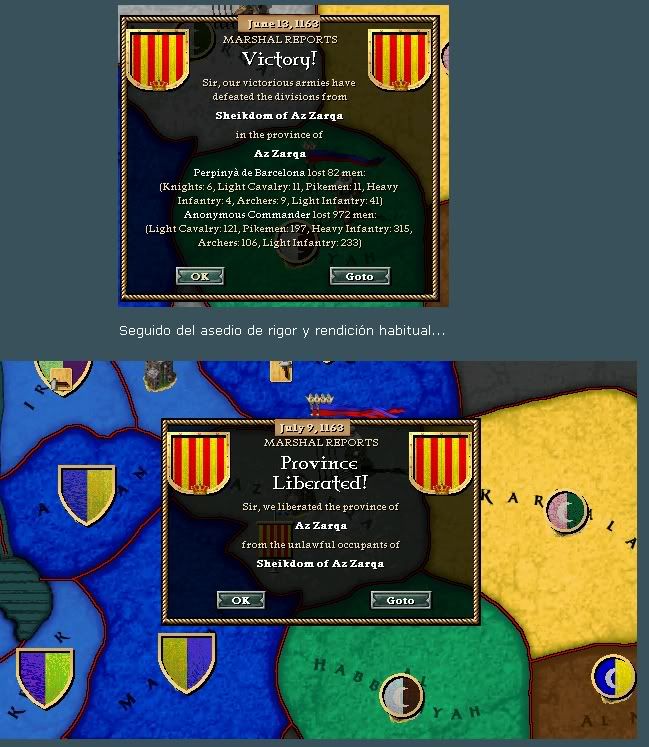Chapter 14th: Thou shalt build the future, my son...
Later on Stenier blamed all that took place to the Bug Phenomenon. Alas, it was a poor excuse. An a false one, it should be added. Good old king Jaume, who wasn't in the mood to write a new Bible, began to give some titles to his most trusted friends as he needed to have some loyal men in Portugal and Egypt, becuase he -the king- felt that some turmoil was going over on those places. Thus, the loyal Mateu, earl of Faro, became duke of Viseu; Ponç Abba, earl of Cairo and Saquiriya, duke of Cairo. Achieved this, Jaume decided it was time to "tempt" a bit the "loyal" Sunyer de Rocabertí, earl and duke of Cordoba and earl of Badajoz, who became duke of Badajoz.
Steiner, who didn't understand this movement, asked the king what on earth he was doing. Theoretically, Steiner said, their common purpose was to curb the power of the nobility. Jaume agreed and, as he was in a wonderful good mood, replied that this was exactly what he was doing. Steiner, of course, didn't agree at all, so he asked why he made Sunyer so powerful with this new title. The answer was quite straightforward. And wrong, we must add, as time will tell:
King Jaume thought that Sunyer, with his new and powerful role in the kingdom, would seek more power, as he had been done until that moment. This it was question of time that Sunyer would go to far. And then...
Jaume (with a big smile): He'll make a mistake and I'll send good old Sunyer to pay a visit to the devil.
Steiner (not quite sure about this claim): What if he doesn't do a mistake?
Jaume (smiling broadly): Thou wouldst help him, my dear friend.
Steiner (taking a sharp tool): Impressive... But something may go wrong...
Jaume: Be water my friend... trust me, my loyal boy...
Steiner couldn't stand such a calmy way, so he went in seach of someone who would make him feel better. So, as my grandpa said once "Thou seakest and thou foundest, even if what thou foundest wans't at all what you wantest".
Finally, on foot, Judas arrives at the gates of the castle, with some of his followers. They are hungry and afraid, as they are surrounded by a silent crowd of Catalan men and women who let them to go through. Judas notices human and wolf teeth strung in necklaces, red eyes and feral fangs, as well as four red stripes on a yellow background which many of those people have in a tattou on their forefront. These are the children of Steiner.
In the courtyard, a big furry dog noses among freshly-severed human heads. Judas is smitten by the stench of decay but tries to hide his distaste by farting. JimboIX and Llywelyn groan and complain. They don't like farting.
A gigolo-like figure scuttles out of the crowds.
Murmurandus: Are you Russian? Yo'm an Englishman. F. Murmurandus, at your service.
He shakes Judas's hand, then hugs him, then he kisses Judas on the lips. His eyes are jittery, mad. Judas looks around, but he has nowhere to run.
Murmurandus: The Master has been waiting for you. I'm a lunatic, you know. I eat pies. Fish and chips. Hamburgers, when I can get them. It's the grease. The grease is the life, as the book says. The Master understands. Steiner. He knows you're coming. He knows everything, even the cell number of Paris Hilton... well, who doesn't know it... Never mind... He's a poet-warrior in the classical sense. He kills you while reciting Petrarca and Woodsworth... wait... I think I'm a bit further in time... I meant... who cares... he's a poet-warrior, and that's all. And he has visions. He's a foreteller. He has the vision when he farts. You'll see, you'll learn.
Judas (scratching his head): To fart?
Murmurandus (not caring about Judas): He's lived through the centuries. His wisdom is beyond ours, beyond anything we can imagine... he has seen things you people wouldn't believe. Attack ships on fire off the shoulder of Orion, he has watched c-beams ... glitter in the dark near Tanhauser Gate. How can I make you understand? He's promised me lives. Many lives. Some nights, he'll creep up on you, while you're shaving, and break your mirror. A foul bauble of man's vanity, foolnesh, pride. The blood of Attila flows in his veins. He is the Master.
Judas looks at the sky and thinks about a lost garden in Kent.
Murmurandus: I know what bothers you. The heads. The severed heads. It's his way. It's the only language they understand. He doesn't love to do it, but he knows he must do it. Some one has to do it, after all. So he kills, as he knows the truth.
Judas ignores the prattle and walks across the courtyard. Scraps of mist waft under his boots. A huge figure fills the doorway. Moonlight shines on his head. Heavy jowls glisten as a humourless smile discloses two red eyes and two long fangs the size of thumbs...
Judas halts.
A bass voice rumbles.
Steiner: I ... am ... Steiner
Thus Steiner found one of the most intrepid and courageous soldiers ever born.
Leonidas: I don't like the plan of your king.
Steiner: Neither do I. Too many things may go wrong.
Leonidas: I don't give a damn about it. There is no massive killing planned. While I was travelling to that place, I haven't found a single narrow place worth of being filled with 300 brave Spartan soldiers. How can you massacrate your enemy without a narrow pass?
Steiner: Gosh... My friend, I think you've come to the wrong AAR...
Leonidas: Is not this place SpAARtaaaaaaaaaaaaaaaaaa?!?!?!?!?!
Steiner (trying to know if his ears still work...): Er... not, it is not, methinks...
Leonidas: Ok, see ya later, folk.
Steiner: Hey! Wait! Can you tell me the cell phone nomber of your queen?
Thus Steiner, by this unexpected meeting, came to put an end to this state of affairs. So our brave heroe (?) had to do something to kept himself busy while he managed to get to know queen Gorgo of Sparta, don't you think? So, Raimundo, earl of Lisbon found himself accused of a sodomy, treason and, worst of all, of being awfully ugly -had been Cardinal Petrus there at that time, this last charge wouldn't have go to Raimundo, but...
The result was quite obvious, as the reader may guess. Raimundo, once deprived of his title, was sent to prison a cold 30 of December of 1162, where he would wait his execution. Thus passeth away Le Comte sans tête...
Jaume (unable to understand): Was Raimundo dangerous for me?
Steiner (reading a letter): No.
Leonidas: No killing, no murder, no shedding of uneeded blood?!?!?!?!?!
Steiner: No.
Leonidas: You affeminate boy-lover. I bet you were born in Athens...
Jaume: So...
Steiner: I was just testing my muscles.
But life went on, and Steiner did his bit to fulfill his plan to create a big kingdom in Palestine. Thus, Perpinyà de Barcelona, duke of Palestine and Galilee and earl of Damascus, Acre, Beirut and Jerusalem, became the duke of Tyre.
It was in this time, March 1162, when Steiner heard that the Norwegian civil war, which had started in may 1161, had just ended. It seemed that Halsen, duke of Bergen and brother of Grelen, sister of Eric the Black, conqueror of the Orkneys, well... as I was saying, Halsen duke of so and so, rebelled against his king Leofwine. Defeated, Halsen lost everything from his neck upwards. Wondering what to do about it, Steiner informed his king about it, who didn't see what interest could find in that distant place. At least, not in that moment.
Then, when Steiner had just begun to court the fair Gorgo, unexpected news arrived.
By some unknown reason Basora declared war to Irbid, in the distant kingdom of Outremer. As Steiner knew later on, someone called Leonidas had killed some of the cousins of the ruler of Basora, just to see what came next. So, the Aragonese armies went to war. First the just broke throught the closest allies of Basora that the could find.
[Note= "Seguido del asedio de rigor y rendición habitual" means "followed by the usual siege and the common habit of surrendering after such a siege". Just to help you to learn Spanish...]
And then they put themselves to work. Next stop: Medina.
What do you say, my dear Leonidas?
Leonidas: Medina is not in the way to Basora.
Steiner: True, very true, my brave Greek king.
Leonidas: Then what the heck are you doinggggggggggggggg?!?!?!?!?!
Steiner: This I'll tell you later on.
Gorgo: When?
Steiner: You should wait to the next chapter, my fair queen... by the way... Have I told you later that you have the most wonderful...




